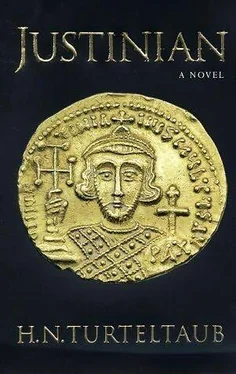Harry Turtledove - Justinian
Здесь есть возможность читать онлайн «Harry Turtledove - Justinian» весь текст электронной книги совершенно бесплатно (целиком полную версию без сокращений). В некоторых случаях можно слушать аудио, скачать через торрент в формате fb2 и присутствует краткое содержание. Жанр: Историческая проза, на английском языке. Описание произведения, (предисловие) а так же отзывы посетителей доступны на портале библиотеки ЛибКат.
- Название:Justinian
- Автор:
- Жанр:
- Год:неизвестен
- ISBN:нет данных
- Рейтинг книги:3 / 5. Голосов: 1
-
Избранное:Добавить в избранное
- Отзывы:
-
Ваша оценка:
- 60
- 1
- 2
- 3
- 4
- 5
Justinian: краткое содержание, описание и аннотация
Предлагаем к чтению аннотацию, описание, краткое содержание или предисловие (зависит от того, что написал сам автор книги «Justinian»). Если вы не нашли необходимую информацию о книге — напишите в комментариях, мы постараемся отыскать её.
Justinian — читать онлайн бесплатно полную книгу (весь текст) целиком
Ниже представлен текст книги, разбитый по страницам. Система сохранения места последней прочитанной страницы, позволяет с удобством читать онлайн бесплатно книгу «Justinian», без необходимости каждый раз заново искать на чём Вы остановились. Поставьте закладку, и сможете в любой момент перейти на страницу, на которой закончили чтение.
Интервал:
Закладка:
MYAKES
Till then, Brother Elpidios, I hadn't known whether Justinian had courage. He'd never needed to show any, if you know what I mean. He had spirit, he had temper- he had temper and to spare- but you can't tell what a man will do when somebody tries to kill him till you see it happen. He turned out to do just fine, thank you. The biggest problem was keeping him away from the Arabs. He wanted to kill every last one of them himself.
The Sklavenoi, Brother? He spent a lot of the retreat to Sebastopolis cursing Neboulos and every one of the barbarians, ranting and fuming about what he should have done to them when we were fighting back in the Sklavinias. He wasn't joking, either. Like he said there, when he said something like that, he meant it. That worried me.
Then he got quiet. That worried me even worse.
Inside the citadel, I stared at Leontios, wishing I could turn him to stone as the monster Medusa had with her victims in pagan myth. "You disobeyed me," I told him in a deadly voice.
"Emperor, I did what I thought best, seeing how things were," he answered. In fact, against him Medusa might have glared in vain, his head already having been formed from solid marble. He went on, "I've been fighting battles for your father and you longer than you've been alive. I know something about them, that I do."
"You disobeyed me!" This time I, shouted it. "You disobeyed me, and we lost the battle on account of it. The blame is yours- yours!" Looking back on it, the last word was probably a scream.
But screaming at Leontios was like screaming at a post. All he did was bow his head slightly, as a traveler in wet weather will do to keep the rain out of his eyes. "Emperor, I didn't do a thing to lose the battle," he said. "Not one thing. If the special army hadn't betrayed us, we might have won."
If your special army hadn't betrayed us, was what he meant, but not even Leontios was blockhead enough to say such a thing to me. Snarling, I answered, "If we'd had a decent attack from the left, not the paltry one we got, we would have smashed the Arabs before the cursed Sklavenoi went over to them. They would have stayed loyal if we'd been winning."
Leontios bowed his head a little farther. "Maybe so, Emperor," he said. "It could be so, I suppose."
He could not have said, Liar, any louder had he bellowed it at the top of his lungs. I sprang to my feet. Had I still been wearing my sword, I would have cut him down where he sat. How much grief and torment that would have saved me in years to come! But God does not reveal to mere men what lies ahead, and, in any case, I had taken off the sword on coming into Sebastopolis. And so, rather than striking that large, hard head from his shoulders, I hit him in the face with my fist, as hard as I could.
He too leaped, with a roar of pain. Blood dribbled from the corner of his mouth. I hit him again. This time, expecting the blow, he bent his head down so that my fist slammed into his skull. Pain shot up my arm: he was hardheaded indeed. I hit him again and again. He did not strike back. Had he done so, even once, I would have given him over to whatever half-skilled torturers a provincial town like Sebastopolis boasted. All he did was keep his head down and bring up his arms to protect his face to some degree.
At last, having done to him what, thanks in great measure to his wanton disobedience, I had not done to the followers of the false prophet, I told him, "Get out, and be grateful for my mercy."
He stumbled away, leaving a trail of blood drops on the timbers of the second-story floor. I was certain I had blackened one of his eyes. Maybe, come tomorrow, he would explain his bruises by saying he had walked into a door, as beaten wives, I am told, often do. Had he been truly considerate, he would have leaped off the city wall and broken his neck, but that, I supposed accurately, was too much to hope for.
I stood there in my chamber, breathing hard. Beating Leontios had left me excited in another way. Going to the door, I spoke in a low voice to one of the excubitores standing guard outside it. He nodded and, after consulting for a moment with his comrade, hurried away.
After about a quarter of an hour; he returned with a woman, as I had asked him to do. I barred the door. Smiling, the woman began to pull off over her head the long tunic she wore. "No," I said harshly. She paused, her face puzzled. I shoved her down onto the bed, ignoring her squawk of surprise, and took her as if by force, pretending she was my captive though she was there of her own free will. I took her several times through the night, using her almost as roughly as I had Leontios. When morning came, I rewarded her well, as her complaisance deserved. And, I vowed, I would reward Leontios as he deserved, too.
Although they had suborned Neboulos and the large majority of the Sklavenoi, although they had defeated the army I had assembled against them, the Arabs did not try to bypass the fortress of Sebastopolis and penetrate deeper into Romania, nor did they linger long around the town. The force we still had was too large to let them split up into raiding parties, which it might have defeated in detail on sallying forth, and large enough to remain a threat to their entire army. After burning some fields and pasturelands nearby, they withdrew.
Had I worn Prince Mouamet's shoes, I would have been bolder. But then, I had seen Leontios's quality only too well, while the Arab might have remained ignorant of the depths of his fecklessness. At any rate, scouts having confirmed that the deniers of Christ were indeed withdrawing, I counted myself and the Roman Empire lucky, in that they were not gaining so great an advantage from their victory as they might have done.
A couple of days after their withdrawal was confirmed, the Roman army also left Sebastopolis. Instead of triumphantly advancing into the lands the Arabs had stolen from my ancestors, we were trudging back toward Constantinople in defeat. That was hard to bear, all the more so in light of the high expectations with which I had invested the campaign.
The men from the Armeniac military district soon detached themselves from the army, returning to the farms they tended when their services as soldiers were not required. The men from the Anatolic military district and that of the Opsikion continued westward with the excubitores. So did the Sklavenoi, a remnant less than a third the number Neboulos had brought to Sebastopolis.
On our reaching Ankyra, the horsemen from the military district of the Opsikion prepared to take the southbound road, going back to their farms and villages. I put a stop to that, ordering them to accompany the rest of the army as we proceeded west toward the Sea of Marmara. Some of the men from the Anatolic military district also wanted to break away from the army: at Ankyra, we were already close to their homes. Again, I did not let this happen.
A few days later, we reached Dorylaion, another good-sized town- or, rather, strong fortress- in the Anatolic military district. Another good road leads south from it into the military district of the Opsikion. Once more, the men from that military district tried to leave the army.
I met with some of their officers, saying, "I have one more task these men can perform for me. I do not think they will find it a disagreeable task, even if it does take them farther from their farms than they might have expected."
"If you tell us what it is, Emperor," one of those officers said, "we'll be able to let them know, and then we won't have the grumbling that's been going through the ranks." His colleagues nodded.
But I shook my head. "Keep them together, and tell them just what I've told you- no more, no less. The mystery will bring them along, I think." I smiled, something I had done little since losing the battle east of Sebastopolis. The officers obeyed me, not least because their curiosity was also piqued.
Читать дальшеИнтервал:
Закладка:
Похожие книги на «Justinian»
Представляем Вашему вниманию похожие книги на «Justinian» списком для выбора. Мы отобрали схожую по названию и смыслу литературу в надежде предоставить читателям больше вариантов отыскать новые, интересные, ещё непрочитанные произведения.
Обсуждение, отзывы о книге «Justinian» и просто собственные мнения читателей. Оставьте ваши комментарии, напишите, что Вы думаете о произведении, его смысле или главных героях. Укажите что конкретно понравилось, а что нет, и почему Вы так считаете.












